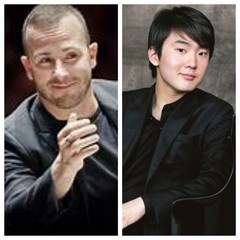|
Back
Replacements from Heaven New York
Stern Auditorium, Carnegie Hall
02/25/2022 -
Sergei Rachmaninoff: Piano Concerto No.2 in C Minor, Opus 18 – Symphony No.2 in E Minor, Opus 27
Seong-Jin Cho (Pianist)
Vienna Philharmonic Orchestra, Yannick Nézet‑Séguin, (Conductor)

Y. Nézet-Séguin/S.-J. Cho
“The prospect of sitting through his music depresses me. All those notes! And to what end?”
Aaron Copland (1900-1990)
(Asked why he was not composing) “How can I compose without a melody?”
Sergei Rachmaninoff (1873-1943)
Carnegie Hall’s decision to replace Gergiev and Matsuev with Yannick Nézet‑Séguin and Seong-Jin Cho this week, augmented by the cancelation of Gergiev’s Mariinsky Orchestra in May, was more than a practical decision (half the audience, including this listener, would have boycotted these concerts). It was an ethical decision. Nothing at all against Russia or Russian people. But both of the scheduled artists were pals with Putin, companion or (in the old Soviet term) comrades of Putin, that person who unashamedly has fused Mongol/Tartar savagery, East German Stasi efficiency, and the bloodthirsty sadism of Joseph Stalin.
Once in Romania, doing stories about the real Dracula, I found no Romanians called him Dracula. He was–even in his lifetime–Vlad the Impaler. That goes for Vladimir Putin as well.
Even more, one realizes that Nézet‑Séguin has a closer relationship with Sergei Rachmaninoff that Gergiev himself. Rachmaninoff lived all his creative life in the United States. And even in Russia, he came from an aristocratic French‑speaking family far from Moscow or St. Petersburg. Besides, Gergiev is not even Russian. He comes from South Ossetia (also seized by Putin).
As for Nézet‑Séguin, this is a man who is conductor of the Philadelphia Orchestra. And no orchestra, European or American, was closer to the composer. As pianist and composer, he always chose Eugene Ormandy’s consort above New York or Chicago.
Has the Philly influence rubbed off on Nézet‑Séguin? A spiritual and historic influence, perhaps. But Nézet‑Séguin has always gone his own creative way, as he did last night.
The start was a splendid performance by the Vienna Philharmonic with the under‑30 Korean pianist Seong‑Jin Cho in Rachmaninoff’s Second Concerto. Mr. Cho won worldwide fame as Gold Medal winner of the 2015 Chopin Competition, and the Chopin feeling was present throughout. His was a fluid performance, from the opening chords through the whole eloquent first movement.
One might have argued with the excessive rubato here (was this Nézet‑Séguin’s choice or Cho’s?), but those were single moments, the movement never descending to the mawkish. After all, Rachmaninoff’s orchestra was on a par with the soloist.
While one shouldn’t dwell on Mr. Cho’s physicality, he is fun to watch, his arms flapping, his feet skating, a few times bouncing on the bench. None of which detracted from his playing.
Mr. Nézet‑Séguin took the orchestra well, literally following the Adagio sostenuto command. Too many conductors speed it up, afraid of delving into the sentimental. But Nézet‑Séguin, Cho and the Vienna First Chair soloists (especially the clarinet) kept it all at a sensible pace.
That finale was the test of Mr. Cho’s technique, which is plainly fabulous It took a few seconds for the pianist’s opening to marry up with Nézet‑Séguin’s fractionally more moderate orchestra. Once they were together, both Cho, Nézet‑Séguin and Vienna led these triumphant martial finale notes to an expansive ending.
For an encore, Cho showed why he had also been a prize-winner in the Tchaikovsky competition, playing a relaxed “October” from The Seasons.
While that was a good performance, Rachmaninoff’s Concerto has thousands of good performances. The Second Symphony, also popular, when played well, is eternally memorable. And with the few faultless recordings (I think of Rattle and Previn), one gets eternal joy.
Mr. Nézet‑Séguin did more than take advantage of the lush orchestral colors of the Vienna Phil. He combined those lush dark colors with pacing which pushed them ever onward, ever forward to the bellicose ending.
After the first movement last night, I simply sat back, forgetting whether Mr. Nézet‑Séguin went over the top, or was too brash. This was a one‑hour golden tapestry of sounds and melodies, darkness and fantasy (how the hell was it played with all those cuts until two decades ago?), which never let up.
The opening movement did show a clarity and precision in those great string sections. The second movement was for the brass, entering, like Pluto from Hades, at all the right times. Mr. Nézet-Séguin gave the Adagio all the glory needed. And for those of us suckers for Russian victorious finales, Mr. Nézet‑Séguin did us justice.
While no encores were due (and none given) Mr. Nézet‑Séguin could have repeated the Second Symphony, in its entirety and nobody with ears would have even considered leaving the hall.
Harry Rolnick
|